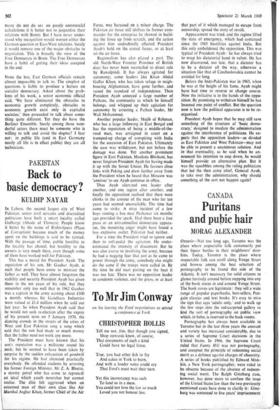Back to basic democracy?
PAKISTAN KULDIP NAYAR
In Lahore, the second largest city of West Pakistan, senior civil servants and discredited politicians have built a smart locality called Gulbarge (Abode of Flowers). People know it better by the name of Rishivitpura (Place of Corruption) because much of the money spent on the buildings is said to be tainted. With the passage of time, public hostility to the locality has abated; but hostility to the owners is very much there, even though some of them have worked well for Pakistan.
This has a moral for President Ayub. The reputation of his son, Mr Gauhar Ayub, is such that people have come to mistrust the father as well. They have almost forgotten the stability and security President Ayub has given them in the ten years of his rule, but they remember only too well that in 1962 Gauhar was a captain in the army earning about £100 a month, whereas his Gandhara Industries were valued at £1.4 million when he sold out last year. So when President Ayub said that he would not seek re-election after the expiry of his present term on 5 January 1970, the dancing crowds in the streets of the cities of West and East Pakistan sang a song which said that the son had made so much money that the father need not work any more.
The President must have known that his son's reputation was a millstone round his neck; but he seemed to have been taken by surprise by the sudden exhaustion of goodwill for his regime. He had alienated practically everybody. He offended students by arresting his former Foreign Minister, Mr Z. A. Bhutto, a stormy petrel who has come to represedt an ideal which youth nourishes but cannot realise. The dlite felt aggrieved when an esteemed man of their own class like Air Marshal Asghar Khan, former Chief of the Air Force, was harassed on a minor charge. The Pakistan air force still idolises its former com- mander for the enterprise he showed in build- ing the force up from scratch, and the action against him undoubtedly affected President Ayub's hold on the armed forces, or at least on the air force.
Regionalism has also played a part. The old North-West Frontier Province of British
days- has never been reconciled to direct rule
by Rawalpindi. It has always agitated for autonomy; some leaders like Khan Abdul Gaffar Khan, who has taken refuge in neigh- bouring Afghanistan, have gone further, and raised the standard of independence. Then President Ayub annoyed a large number of Pathans, the community to which he himself belongs, and whipped up their agitation for autonomy by arresting a Pathan leader, Mr Wall Mohammed.
Another popular leader, Mujib ul Rehman, who has a large following in East Bengal and has the reputation of being a middle-of-the- road man, was arraigned in court on a trumped-up charge of conspiring with India for the secession of East Pakistan. Ultimately the case was withdrawn, but not before the damage was done. Yet another prominent figure in East Pakistan, Maulana Bhishani, has never forgiven President Ayub for having made it up with the Soviet Union. He favours close links with Peking and drew further away from the President when he heard that Moscow was `anxious' to see Ayub continue in office.
Thus Ayub alienated one leader after another, and one region after another, and finally the opposition realised that there were chinks in the armour of the man who for ten years had seemed unassailable. The time had come to strike. A stray incident of a few boys stoning a bus near Peshawar six months ago provided the spark. Had there been a free press or an untrammelled democratic appara- tus, the mounting anger might have found a less explosive outlet. Pakistan had neither.
For a time the President tried to ignore and then to soft-pedal the agitation. He under- estimated the intensity of discontent. But he was also averse to involving the army, because he had a nagging fear that just as he came to power through the army, somebody else might do the same if the troops were called in. By the time he did start putting on the heat it was too late. There was no opposition leader to condemn violence, and the press, or at least
that part of it which managed to escape from censorship, spread the story of revolt.
Appeasement was tried, and the regime lifted the state of emergency, which had continued since the 1965 hostilities against India. But this only emboldened the opposition. This was typical of President Ayub: he has always tried to wrap his dictatorial hand in velvet. He has now discovered, too late, that a dictator has to be a dictator all the way, otherwise a situation like that of Czechoslovakia cannot be avoided for long.
Before the Indo-Pakistan war in 1965, when he was at the height of his fame, Ayub might have had time to reverse or change course.
Now the initiative is in the hands of the oppo- sition. By promising to withdraw himself he has lessened one point of conflict. But the question now is how the political apparatus is to be re- organised.
President Ayub hopes that be may still save something of the structure of 'basic demo- cracy,' designed to insulate the administration against the interference of politicians. He ex- pects that the opposition leaders—as divided as East Pakistan and West Pakistan—may not be able to present a unanimous solution. And in that eventuality, as he said when he an- nounced his intention to step down, he would himself provide an alternative plan. But it was the squabbles among the ruling politicians that led the then army chief, General Ayub, to take over the administration; why should something of the sort not happen again?










































 Previous page
Previous page